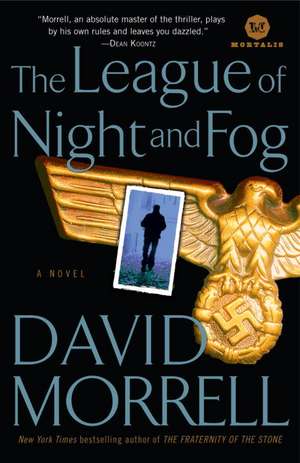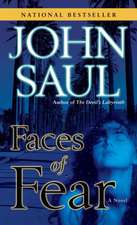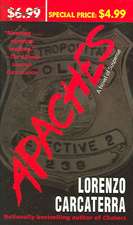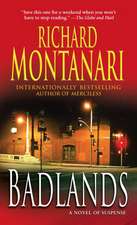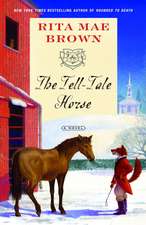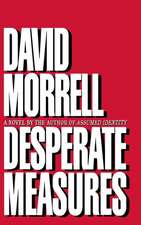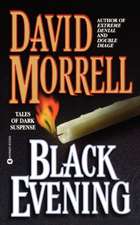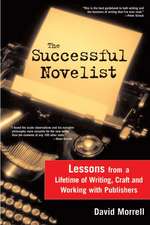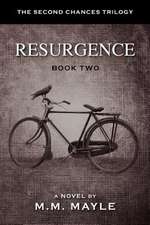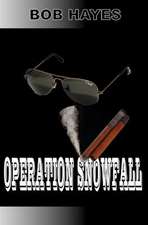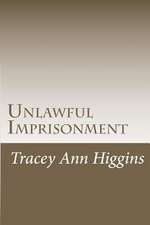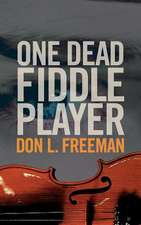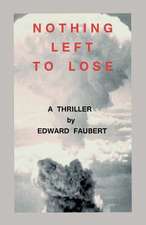The League of Night and Fog: Mortalis
Autor David Morrellen Limba Engleză Paperback – 31 dec 2009
David Morrell's international thrillers have no equal. From the Vatican to the Swiss Alps, from Australia to the heartland of America, The League of Night and Fog brings together two generations bound by one chilling legacy.
Preț: 113.68 lei
Nou
Puncte Express: 171
Preț estimativ în valută:
21.76€ • 23.64$ • 18.29£
21.76€ • 23.64$ • 18.29£
Carte disponibilă
Livrare economică 31 martie-14 aprilie
Preluare comenzi: 021 569.72.76
Specificații
ISBN-13: 9780345512222
ISBN-10: 0345512227
Pagini: 413
Dimensiuni: 132 x 201 x 25 mm
Greutate: 0.39 kg
Editura: BALLANTINE BOOKS
Seria Mortalis
ISBN-10: 0345512227
Pagini: 413
Dimensiuni: 132 x 201 x 25 mm
Greutate: 0.39 kg
Editura: BALLANTINE BOOKS
Seria Mortalis
Notă biografică
David Morrell is the award-winning author of First Blood—the novel in which Rambo was created—as well as twenty-seven other books. This book was the basis for the 1989 mini-series starring Robert Mitchum. With eighteen million copies in print, his work has been translated into twenty-six languages. He was a professor in the English department at the University of Iowa and currently serves as the copresident of the International Thriller Writers organization. He lives in Santa Fe, New Mexico, with his wife.
Extras
ICICLE
Chapter One
cardinal's disappearance remains a mystery
rome, italy, February 28 (AP)—Vatican officials and Rome police remain baffled five days after the disappearance of Cardinal Krunoslav Pavelic, influential member of the Roman Catholic Church's administration group, the Curia.
Pavelic, seventy-two, was last seen by close associates after celebrating a private mass in the chapel of his Vatican living quarters Sunday evening. On Monday, he had been scheduled to give the keynote address to a widely publicized conference of Catholic bishops on the subject of the Church's political relations with Eastern European communist regimes.
Authorities at first suspected right-wing terrorists of abducting Cardinal Pavelic to protest a rumored softening of the Vatican's attitude toward any communist regime willing to ease restrictions on Church activities. However, no extremist group has so far claimed responsibility for Pavelic's disappearance.
Chapter Two
St. Paul, Minnesota. March. For the second time that night, the cards Frank Miller held became a blur. Though red and black were distinct, he couldn't tell the difference between a heart and a diamond or a spade and a club. Trying to subdue his concern, he took off his glasses, rubbed his eyes, and massaged his aching forehead.
"Something the matter?" Sid Henderson asked across the table from him. Like Miller, Henderson was in his seventies. Indeed all the bridge players in this room in the St. Paul community service center were either that old or just slightly younger.
Miller strained to focus on his cards. "The matter? Nothing."
"You sure? You look kinda sick."
"It's too hot in here. They've turned up the thermostat too high. Somebody ought to open some windows."
"And give us all pneumonia?" Iris Glickman asked to Miller's right. She claimed she was only sixty-seven. "It's freezing outside. If you're hot, take off your suit-coat."
But Miller had already loosened his tie. He couldn't allow himself to ignore decorum completely and play cards in his shirtsleeves.
"Maybe you should go home," Harvey Ginsberg said on the left. "You're awful pale."
Miller dabbed his sweaty brow with a handkerchief; his stomach felt queasy. "You need four players. I'd ruin the game for everybody."
"Screw the game," Harvey said.
As usual, Iris pursed her lips in pretended shock at Harvey's vulgar language.
Miller's forehead throbbed. "You won't think I'm a poor sport?"
"What I'll think, Frank, is you're a damned fool if you're sick and you don't go home."
Miller smiled. "Such good friends."
"I'll call you tomorrow and make sure you're feeling better," Harvey said.
Chapter Three
The instant Miller stepped from the hall, an icy wind stung his face. Shocking snow pelted him as he trudged toward the parking lot across the street, clutching his overcoat. At least he didn't feel ill anymore. The gusts revived him, affirming his suspicion that his headache and nausea had been caused by excessive heat inside the hall. He fondly remembered the winters of his youth. Toboggan rides and ice-skate races. My mind's still spry, he thought. It's this damned body that's let me down.
The street was deserted; the arc lamps in the parking lot were shrouded by falling snow. He reached his car—an Audi, a gift from his son—unlocked the driver's door, and heard a voice behind him.
Frowning, he turned, straining to see through the swirling snow. The voice had been muffled by the shriek of the wind. A man's voice, he thought, but when he didn't hear it again, he began to wonder if his ears were playing a trick on him.
He shrugged and gripped the latch on his car door. But again he heard the voice behind him, closer, though still not distinct. It seemed to be saying a single word, a first name, his first name.
Once more, he turned. "Is someone there?"
No answer.
He opened the Audi's door.
A hand grasped his shoulder, preventing him from getting in. Another hand slammed the door shut. A third hand spun him with such force that he almost lost his glasses. Three men. The snow obscured their faces.
"Please. I'm old. Take my wallet. But just don't hurt me."
"Wallet?" One of them laughed.
The snow lessened. When he saw their faces and understood what they really wanted, he despaired.
Chapter Four
Sounds we don't hear can sometimes wake us. So it was that William Miller, unconsciously aware of the silence outside his bedroom windows, began to squirm in his sleep. Like a father whose rest is not complete until his teenage son or daughter comes home from a date that shouldn't have lasted past midnight, he felt uneasy because no car had entered the driveway, no automatic garage door had rattled as it opened and shut. But he wasn't a father who waited for his son. The opposite—a son, who waited for his father. His mental alarm went off. He opened his eyes and blinked at the digital clock beside his bed.
2:38 a.m.
Taking care not to wake his wife, he eased from bed and peered out a window toward the driveway below. A distant streetlight glinted off falling snow. Fir trees were cloaked with white. There weren't any tire tracks in the driveway.
"What's the matter, hon?"
He turned to his wife. "Sorry. I tried to be quiet."
"I couldn't sleep either. What are you looking at?"
"It's what I'm not looking at that bothers me."
Miller explained.
"No tire tracks?" She slipped from bed and put on a robe. "Maybe it snowed after he got in."
"Yeah . . . maybe."
He left the bedroom, passed his children's rooms, and reached his father's room at the opposite end of the hallway. When he didn't see a form on the bed, he flicked on the light. The room was empty.
His wife appeared beside him. "Let's think a minute. This might not mean anything. He might be downstairs asleep in front of the television."
"Maybe."
They went downstairs but couldn't find him.
"Car trouble?"
"He'd have phoned," Miller said.
"Unless he's with a friend."
"This late? He hardly ever stays out past midnight."
"I said with a friend. He might have decided to spend the night."
"With a woman?"
She smiled. "Why not?"
"It doesn't make a difference. He'd still have phoned."
"Unless he felt embarrassed."
"What?"
"You know, with your mother dead a year now and . . ."
"Hey, I loved my mother, and I'm sorry she's gone. But if he's still interested in women at his age, more power to him."
"Maybe he doesn't know that's how you feel. Have you ever talked about sex with him?"
"With my seventy-three-year-old father? Give me a break." He studied the kitchen clock. "It's close to three. If he isn't home by three-thirty, I'm calling the cops."
But his father wasn't home by three-thirty, and Miller did call the cops. No auto accidents involving an Audi had been reported. No old men had been admitted to the local hospitals after midnight, and none of those admitted earlier had been Miller's father. The Audi, covered with snow, was discovered in a parking lot across the street from the community service hall. The keys had been dropped and somehow kicked beneath the car.
But Miller's father was never found.
Chapter Five
Mexico City. April. Martin Rosenberg, seventy-two, stepped out of the synagogue, tucked his yarmulke into his suitcoat pocket, and surveyed the cobbled street. From two blocks away, the drone of traffic along the Paseo de la Reforma disturbed his sense of tranquility. To his right, the lights of the ancient castle on Chapultepec hill gleamed against the darkening sky.
He exchanged shaloms with a group of young people coming out of the synagogue and turned left toward a corner. His son's home was five blocks away, one of the historic Spanish mansions interspersed with high-rise apartments in this affluent section of Mexico City. As usual, his son had offered to have him driven to and from the synagogue, but Rosenberg had insisted that walks were essential to his health, and besides, the scenery throughout this district never failed to give him pleasure.
He rounded the corner, proceeding toward the well-lit broad avenue that connected Chapultepec hill with government buildings.
Chapter Six
I don't care how old he is!" Aaron Rosenberg said. "It's never taken him more than an hour to walk back home!" He paced in front of the arched windows that took up one wall of his living room. "But it's been more than two hours, not one!"
With his pencil-thin mustache, aquiline nose, and dark burning eyes, Rosenberg looked more Spanish than Jewish. He seldom went to the synagogue anymore, but he donated generously to it and knew the rabbi, whom he'd telephoned forty-five minutes ago, learning that his father had left the synagogue at dusk.
"Perhaps he stopped to visit with someone," his wife said. Her face was deeply tanned. Thirty-eight, lithe from daily tennis workouts, she wore a solid-gold watch, a turquoise necklace, and a bright red designer version of a peasant skirt and blouse.
"Who? And surely not for two hours."
He saw the headlights of a Mercedes sedan pulling up at the curb. "Esteban's come back. Perhaps he found him."
But Esteban reported that he'd driven along every route that the father would have used to return from the synagogue. Then he had widened his search to every street within a twenty-block grid. Other servants, having searched on foot, came back with the same disturbing report.
"Go back out again! Keep looking!"
Rosenberg called every hospital in Mexico City. Nothing. At midnight, when the servants again returned without his father, he sacrificed a cardinal rule of his import-export business—never deal with the police except to bribe them—and phoned a captain whose home on Lake Chalco, eight miles south of the city, had recently been renovated thanks to Rosenberg.
One month later, his father had still not been found.
Chapter One
cardinal's disappearance remains a mystery
rome, italy, February 28 (AP)—Vatican officials and Rome police remain baffled five days after the disappearance of Cardinal Krunoslav Pavelic, influential member of the Roman Catholic Church's administration group, the Curia.
Pavelic, seventy-two, was last seen by close associates after celebrating a private mass in the chapel of his Vatican living quarters Sunday evening. On Monday, he had been scheduled to give the keynote address to a widely publicized conference of Catholic bishops on the subject of the Church's political relations with Eastern European communist regimes.
Authorities at first suspected right-wing terrorists of abducting Cardinal Pavelic to protest a rumored softening of the Vatican's attitude toward any communist regime willing to ease restrictions on Church activities. However, no extremist group has so far claimed responsibility for Pavelic's disappearance.
Chapter Two
St. Paul, Minnesota. March. For the second time that night, the cards Frank Miller held became a blur. Though red and black were distinct, he couldn't tell the difference between a heart and a diamond or a spade and a club. Trying to subdue his concern, he took off his glasses, rubbed his eyes, and massaged his aching forehead.
"Something the matter?" Sid Henderson asked across the table from him. Like Miller, Henderson was in his seventies. Indeed all the bridge players in this room in the St. Paul community service center were either that old or just slightly younger.
Miller strained to focus on his cards. "The matter? Nothing."
"You sure? You look kinda sick."
"It's too hot in here. They've turned up the thermostat too high. Somebody ought to open some windows."
"And give us all pneumonia?" Iris Glickman asked to Miller's right. She claimed she was only sixty-seven. "It's freezing outside. If you're hot, take off your suit-coat."
But Miller had already loosened his tie. He couldn't allow himself to ignore decorum completely and play cards in his shirtsleeves.
"Maybe you should go home," Harvey Ginsberg said on the left. "You're awful pale."
Miller dabbed his sweaty brow with a handkerchief; his stomach felt queasy. "You need four players. I'd ruin the game for everybody."
"Screw the game," Harvey said.
As usual, Iris pursed her lips in pretended shock at Harvey's vulgar language.
Miller's forehead throbbed. "You won't think I'm a poor sport?"
"What I'll think, Frank, is you're a damned fool if you're sick and you don't go home."
Miller smiled. "Such good friends."
"I'll call you tomorrow and make sure you're feeling better," Harvey said.
Chapter Three
The instant Miller stepped from the hall, an icy wind stung his face. Shocking snow pelted him as he trudged toward the parking lot across the street, clutching his overcoat. At least he didn't feel ill anymore. The gusts revived him, affirming his suspicion that his headache and nausea had been caused by excessive heat inside the hall. He fondly remembered the winters of his youth. Toboggan rides and ice-skate races. My mind's still spry, he thought. It's this damned body that's let me down.
The street was deserted; the arc lamps in the parking lot were shrouded by falling snow. He reached his car—an Audi, a gift from his son—unlocked the driver's door, and heard a voice behind him.
Frowning, he turned, straining to see through the swirling snow. The voice had been muffled by the shriek of the wind. A man's voice, he thought, but when he didn't hear it again, he began to wonder if his ears were playing a trick on him.
He shrugged and gripped the latch on his car door. But again he heard the voice behind him, closer, though still not distinct. It seemed to be saying a single word, a first name, his first name.
Once more, he turned. "Is someone there?"
No answer.
He opened the Audi's door.
A hand grasped his shoulder, preventing him from getting in. Another hand slammed the door shut. A third hand spun him with such force that he almost lost his glasses. Three men. The snow obscured their faces.
"Please. I'm old. Take my wallet. But just don't hurt me."
"Wallet?" One of them laughed.
The snow lessened. When he saw their faces and understood what they really wanted, he despaired.
Chapter Four
Sounds we don't hear can sometimes wake us. So it was that William Miller, unconsciously aware of the silence outside his bedroom windows, began to squirm in his sleep. Like a father whose rest is not complete until his teenage son or daughter comes home from a date that shouldn't have lasted past midnight, he felt uneasy because no car had entered the driveway, no automatic garage door had rattled as it opened and shut. But he wasn't a father who waited for his son. The opposite—a son, who waited for his father. His mental alarm went off. He opened his eyes and blinked at the digital clock beside his bed.
2:38 a.m.
Taking care not to wake his wife, he eased from bed and peered out a window toward the driveway below. A distant streetlight glinted off falling snow. Fir trees were cloaked with white. There weren't any tire tracks in the driveway.
"What's the matter, hon?"
He turned to his wife. "Sorry. I tried to be quiet."
"I couldn't sleep either. What are you looking at?"
"It's what I'm not looking at that bothers me."
Miller explained.
"No tire tracks?" She slipped from bed and put on a robe. "Maybe it snowed after he got in."
"Yeah . . . maybe."
He left the bedroom, passed his children's rooms, and reached his father's room at the opposite end of the hallway. When he didn't see a form on the bed, he flicked on the light. The room was empty.
His wife appeared beside him. "Let's think a minute. This might not mean anything. He might be downstairs asleep in front of the television."
"Maybe."
They went downstairs but couldn't find him.
"Car trouble?"
"He'd have phoned," Miller said.
"Unless he's with a friend."
"This late? He hardly ever stays out past midnight."
"I said with a friend. He might have decided to spend the night."
"With a woman?"
She smiled. "Why not?"
"It doesn't make a difference. He'd still have phoned."
"Unless he felt embarrassed."
"What?"
"You know, with your mother dead a year now and . . ."
"Hey, I loved my mother, and I'm sorry she's gone. But if he's still interested in women at his age, more power to him."
"Maybe he doesn't know that's how you feel. Have you ever talked about sex with him?"
"With my seventy-three-year-old father? Give me a break." He studied the kitchen clock. "It's close to three. If he isn't home by three-thirty, I'm calling the cops."
But his father wasn't home by three-thirty, and Miller did call the cops. No auto accidents involving an Audi had been reported. No old men had been admitted to the local hospitals after midnight, and none of those admitted earlier had been Miller's father. The Audi, covered with snow, was discovered in a parking lot across the street from the community service hall. The keys had been dropped and somehow kicked beneath the car.
But Miller's father was never found.
Chapter Five
Mexico City. April. Martin Rosenberg, seventy-two, stepped out of the synagogue, tucked his yarmulke into his suitcoat pocket, and surveyed the cobbled street. From two blocks away, the drone of traffic along the Paseo de la Reforma disturbed his sense of tranquility. To his right, the lights of the ancient castle on Chapultepec hill gleamed against the darkening sky.
He exchanged shaloms with a group of young people coming out of the synagogue and turned left toward a corner. His son's home was five blocks away, one of the historic Spanish mansions interspersed with high-rise apartments in this affluent section of Mexico City. As usual, his son had offered to have him driven to and from the synagogue, but Rosenberg had insisted that walks were essential to his health, and besides, the scenery throughout this district never failed to give him pleasure.
He rounded the corner, proceeding toward the well-lit broad avenue that connected Chapultepec hill with government buildings.
Chapter Six
I don't care how old he is!" Aaron Rosenberg said. "It's never taken him more than an hour to walk back home!" He paced in front of the arched windows that took up one wall of his living room. "But it's been more than two hours, not one!"
With his pencil-thin mustache, aquiline nose, and dark burning eyes, Rosenberg looked more Spanish than Jewish. He seldom went to the synagogue anymore, but he donated generously to it and knew the rabbi, whom he'd telephoned forty-five minutes ago, learning that his father had left the synagogue at dusk.
"Perhaps he stopped to visit with someone," his wife said. Her face was deeply tanned. Thirty-eight, lithe from daily tennis workouts, she wore a solid-gold watch, a turquoise necklace, and a bright red designer version of a peasant skirt and blouse.
"Who? And surely not for two hours."
He saw the headlights of a Mercedes sedan pulling up at the curb. "Esteban's come back. Perhaps he found him."
But Esteban reported that he'd driven along every route that the father would have used to return from the synagogue. Then he had widened his search to every street within a twenty-block grid. Other servants, having searched on foot, came back with the same disturbing report.
"Go back out again! Keep looking!"
Rosenberg called every hospital in Mexico City. Nothing. At midnight, when the servants again returned without his father, he sacrificed a cardinal rule of his import-export business—never deal with the police except to bribe them—and phoned a captain whose home on Lake Chalco, eight miles south of the city, had recently been renovated thanks to Rosenberg.
One month later, his father had still not been found.
Recenzii
"Morrell, an absolute master of the thriller, plays by his own rules and leaves you dazzled."—Dean Koontz
"David Morrell is, to me, the finest thriller writer living today, bar none."—Steve Berry
"Splendid, state-of-the-art . . . action/adventure . . . Morrell's forte is action, and there is plenty of that here."—Washington Post Book World
"A wildly Ludlumesque thriller . . . an exciting and entertaining adventure."—Publishers Weekly
"David Morrell is, to me, the finest thriller writer living today, bar none."—Steve Berry
"Splendid, state-of-the-art . . . action/adventure . . . Morrell's forte is action, and there is plenty of that here."—Washington Post Book World
"A wildly Ludlumesque thriller . . . an exciting and entertaining adventure."—Publishers Weekly
